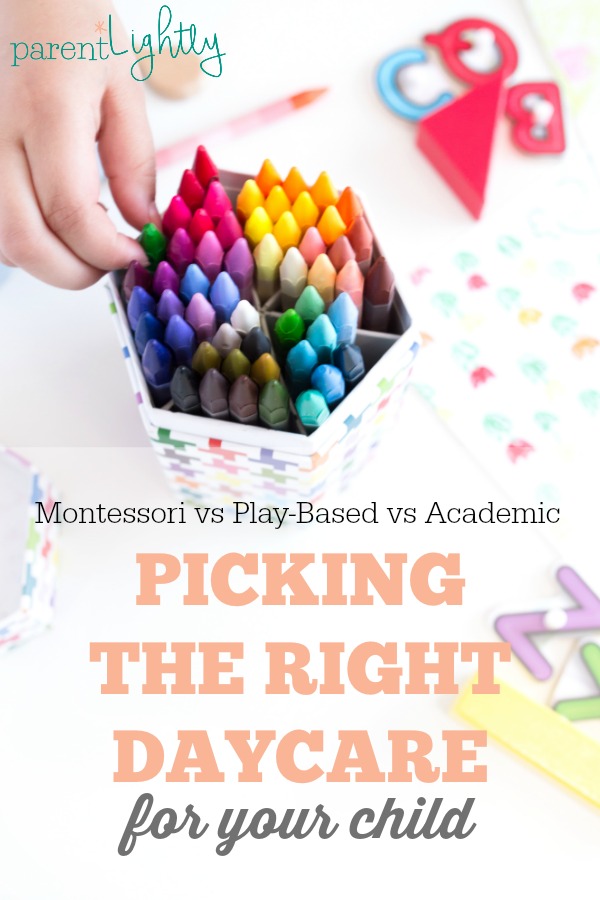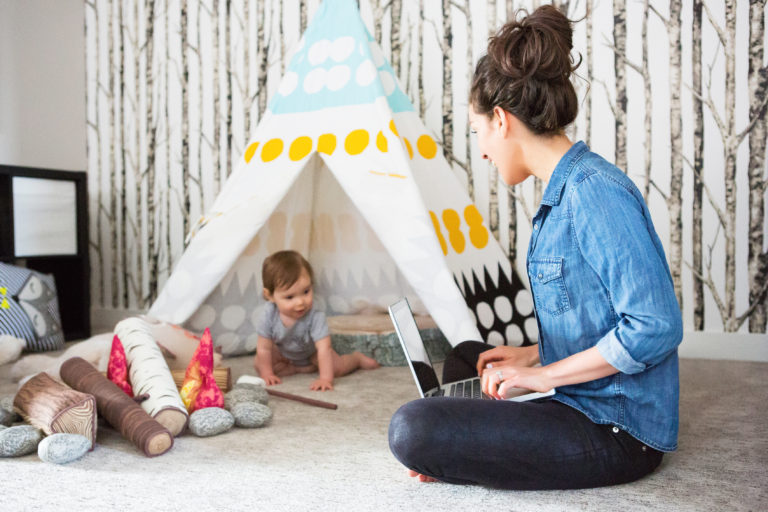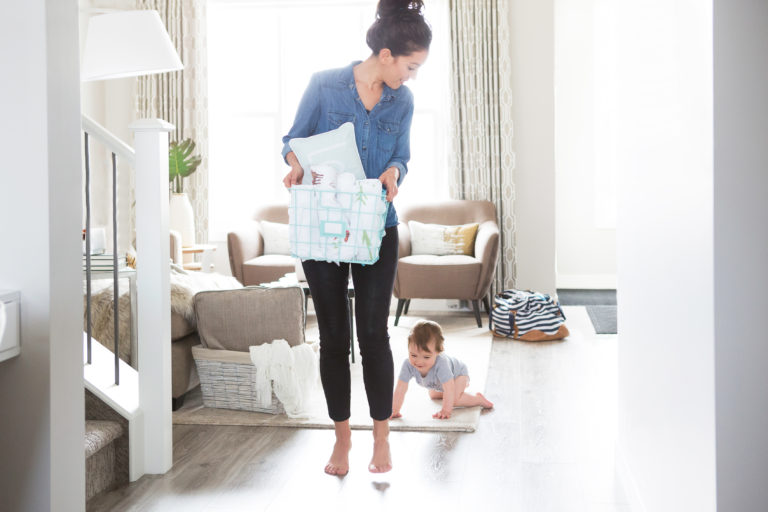How to Choose A Daycare That Will be the Perfect Fit for Your Child

When I went back to work after my first daughter was born, I worried. Constantly.
Going back to work after my second arrived? A thousand times easier.
One of the BIGGEST reasons that I felt more comfortable the second time around was that I was one hundred percent confident in my second daughter’s childcare situation.
You see, when I was a new mom, I didn’t have any idea how to choose a daycare. What should I look for? What should I ask? Which philosophy is best? Because I wasn’t confident in our childcare choices, I spent my workdays concerned that my daughter wasn’t sleeping or eating or being cuddled enough. Talk about distracting!
The search for the right childcare can be really tough! Your child will spend a ton of time there, so you want to get it right. There are many different early childhood education philosophies out there, and they’re certainly not one-size-fits-all. So much depends on your family and your child’s personality.
When you know your family’s needs, and a little bit about the different early education approaches, you’ll be able to ask the right questions at a school tour and find the daycare that’s right for your child!
All About Your Family
Before you start the childcare search process, think about your family. Ask yourself some important questions about your parenting style, your child’s personality and your family’s needs. Of course, not all questions will apply to your situation, depending on how old your child is when you go through this process.
Parenting Style
- What kind of parenting philosophy do you have?
- Are academics, creativity or self-sufficiency most important to you?
- Do you prefer positive parenting or a more traditional approach to discipline?
- Are you a more intense person, or laid back?
Child’s Personality
- Does your child need structure or is he self-motivated?
- Is your child interested in group play or is she content playing on her own?
- Does he need a lot of exercise, or would he prefer to stay inside and draw, color or write?
- Is your child laid-back or strong-willed?
- What types of activities does your child typically enjoy the most at home?
Family Needs
- Do you have other children who will be attending the same school?
Answering these questions will really help you clarify what you’re looking for, and ask the right things when you tour a school.
There are many different types of daycare programs. I’ll cover the three that I have personal experience with. Each approach to early childcare has some benefits and some drawbacks, so it’s really up to you to pick the one that is the best fit for your situation.
Academic
This type of daycare is focused on structured learning. Large national chains like Primrose School and The Goddard School are great examples of this type of school.
What to Look for On your Tour
- Lots of discussion about the structured curriculum
- Emphasis on kindergarten readiness
- Frequent assessments
- Children engaged in teacher-led activities and/or sitting at tables working in older age group classrooms
Benefits
- The structured approach helps you stay up to speed on what your child is doing
- You feel like your child’s time in care is being spent in a productive and enriching way, and that they aren’t just spending the whole day playing
- Your child may start kindergarten more prepared than peers
- Frequent assessments may allow you to discover true developmental issues sooner
Drawbacks
- The environment may be too structured and focused for many young children
- A greater emphasis on academic learning means less focus on creativity and imaginary play
- Early academic programs have been shown to have neutral to negative long-term effects
- You may feel anxious that your child is “behind” when he is actually developmentally normal for his age
Play-Based
Play-based programs emphasize play as the tool that young children use to learn. These schools put less emphasis on academic work and kindergarten preparation, and instead focus on imaginary play, the arts and social development.
What to Look for on Your Tour
- Their philosophy is that play is the work of the young child
- Lots of space in the classroom devoted to imaginary play, dress-up and creative arts
- Less emphasis on kindergarten readiness
- Children are playing in a less structured way rather than being engaged in formal learning activities with teachers
- Formal instruction seems relaxed
- The school gives formal assessments infrequently (once or twice a year)
Benefits
- Encourages children to develop creativity and imagination
- Emphasizes social and emotional development
- A play-based early childhood approach is associated with better long-term outcomes
- You’ll feel that your child will get to have fun and be a kid
Drawbacks
- With less structure, you may not feel that you know what your child is doing all day
- Kids may be less prepared when they start Kindergarten
- Fewer formal evaluations may increase the time to spot true developmental delays
Montessori
The Montessori philosophy was developed by Dr. Maria Montessori, an Italian physician and educator, in the early 1900’s. There is no official governing organization of Montessori education, so the application of the approach can vary pretty widely. If you are interested in a Montessori school, research the Montessori philosophy and then make sure to observe how it is applied in the school you’re considering.
What to Look for On Your Tour
- Child-sized furniture, real-life kitchen tools and personal care items
- Distinct centers in the classroom for different subjects
- Activities referred to as “work”
- Teacher’s role is to guide the child based on the child’s own interests, not to instruct or direct
- The school does not give formal assessments
Benefits
- Encourages children to develop independence and self-reliance
- Children can move at their own pace in their work, whether that is faster or slower than average
- The environment is very calm, without anything to overload the child’s senses
- A multi-sensory approach to teaching means that the approach can work with a variety of different learning styles
- The child can focus on the things that they’re particularly interested in
Drawbacks
- The calm and quiet environment may be challenging for more energetic, social children
- Less focus on imaginary play
- Classrooms with different ages (like 3-5 years old) mean that children learn some of the bad habits of multiple age groups, not just their own
- Lack of formal assessments may make some parents feel as if they don’t know what their child is doing
- The gentle approach to discipline may not be effective for kids with very assertive personalities
Go With Your Gut
Ultimately, only you can decide how to choose a daycare. You know what’s best for you and your child! Don’t be afraid to ask tough questions. Take as many tours as you need to! Use this guide to make sure you know what to look for at each school. You will be so much more productive at work when you are 100% confident in your childcare situation, so it absolutely pays to get it right.





